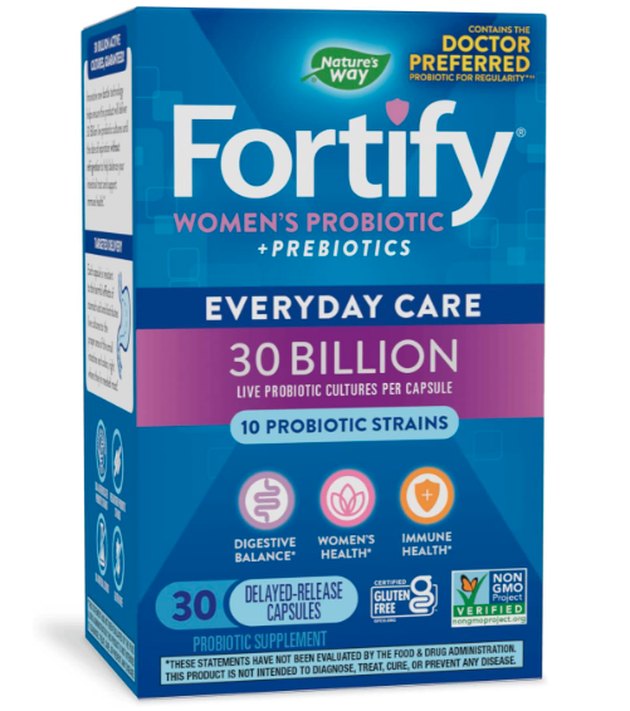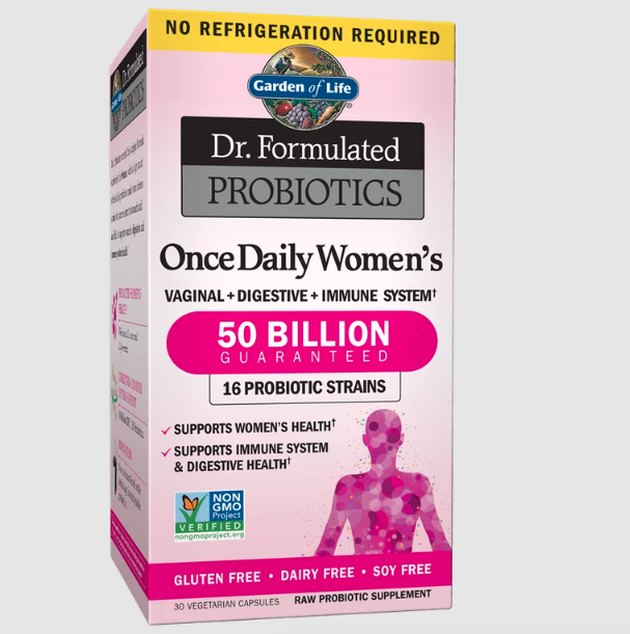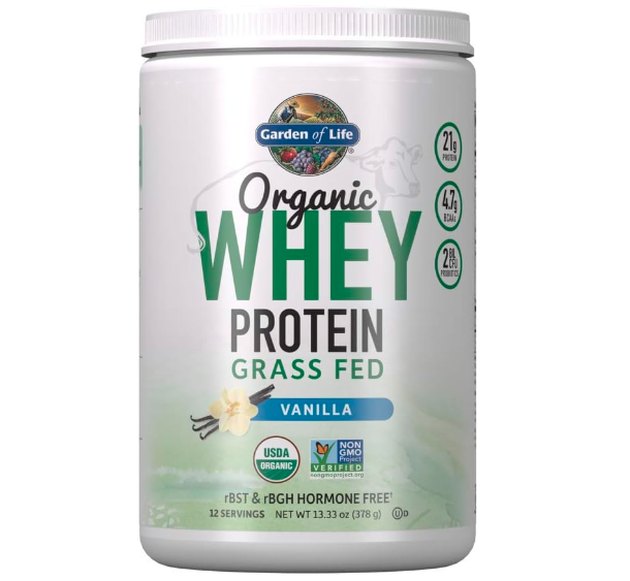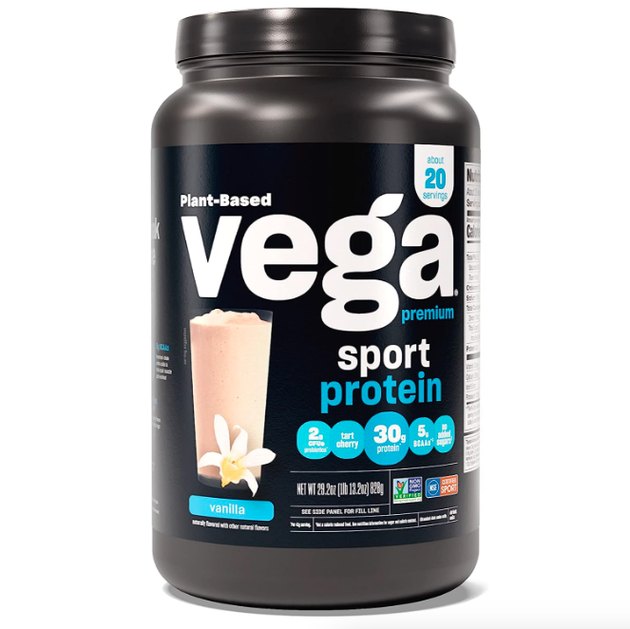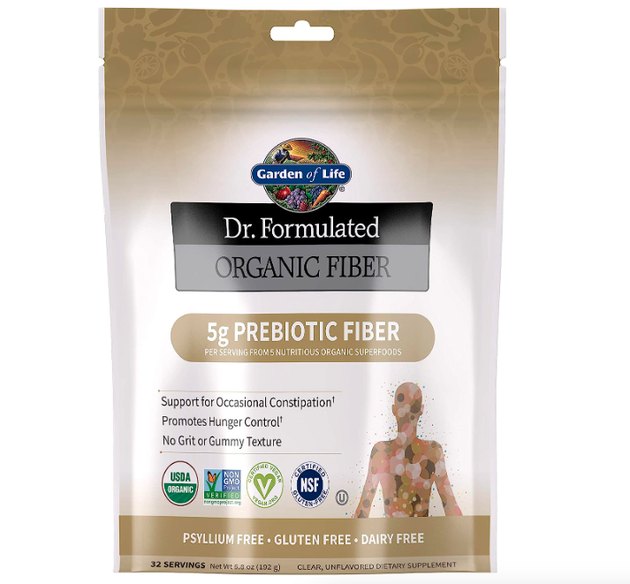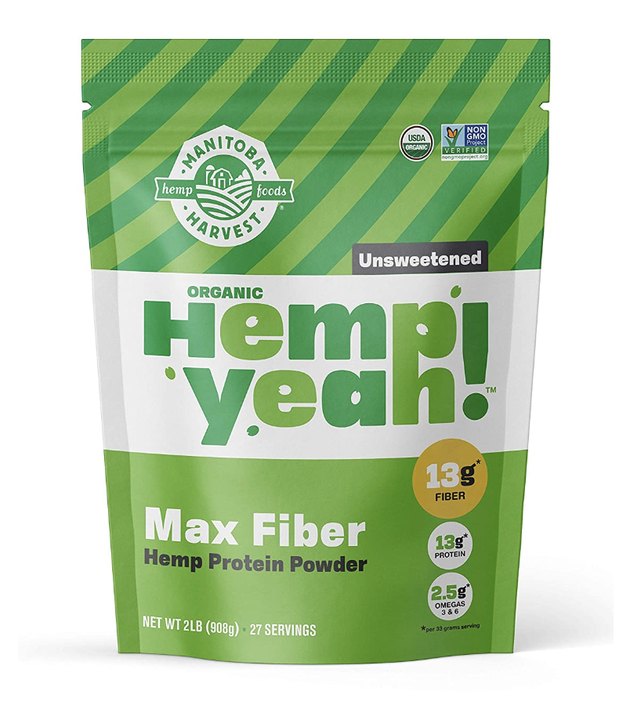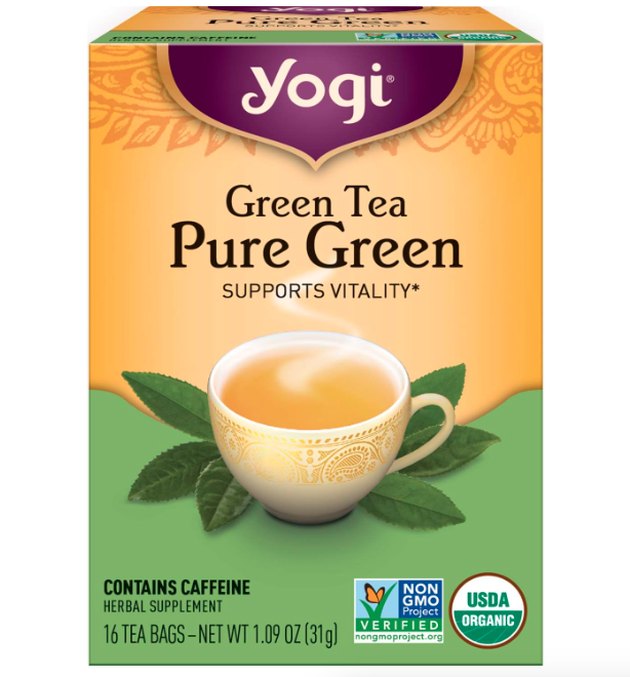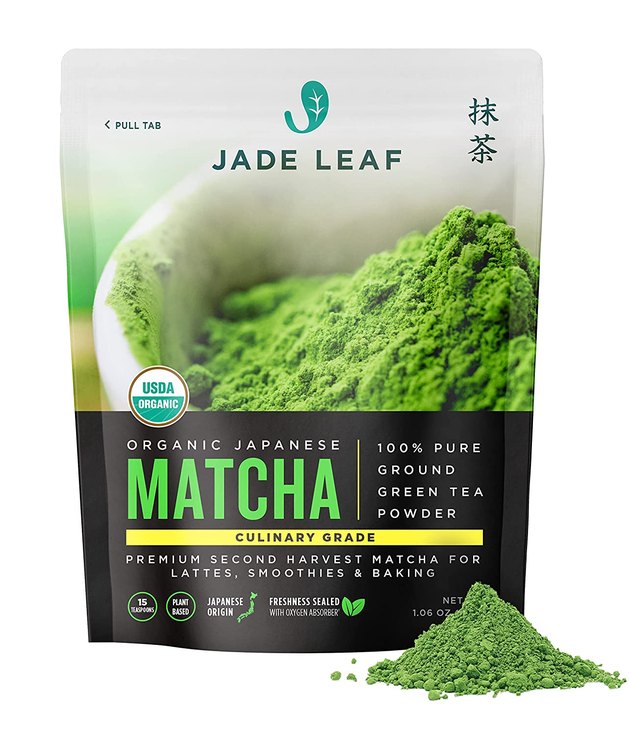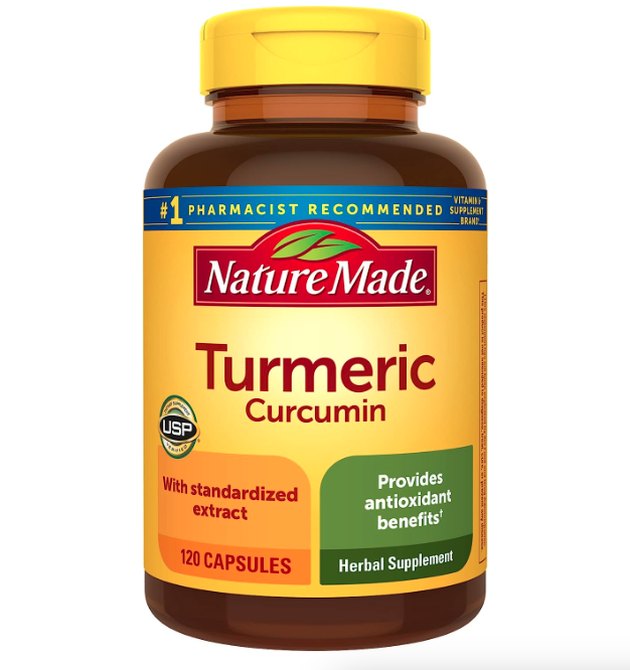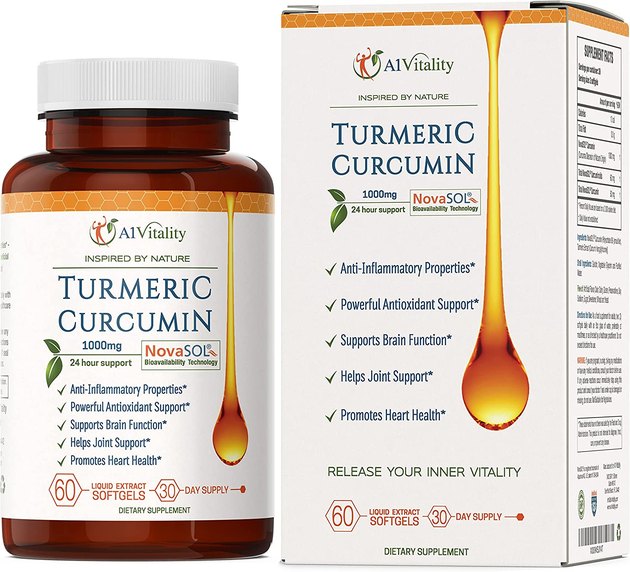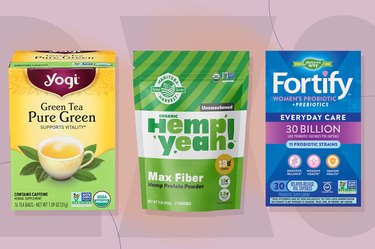
When you think of weight-loss supplements, the dreaded "diet pills" probably come to mind. Unfortunately, these can come with a wide range of side effects that may make the trade-off of weight loss slightly less appealing.
But there are supplements that can help you lose weight that don't come with the physical and mental drawbacks of some popular weight-loss pills.
Video of the Day
Video of the Day
A Note on Language
Here at LIVESTRONG.com, we typically use inclusive language when it comes to sex and gender. These supplements may help anyone achieve their weight-loss goals, regardless of gender, but we've used "women" throughout where it matches the language used by certain supplement manufacturers.
The Best Weight-Loss Supplements for Women Over 40
- Probiotics: Fortify Women's Probiotic ($17.39, Amazon)
- Protein Powder: Garden of Life Organic Whey Protein ($30.09, Amazon)
- Fiber: Garden of Life Organic Fiber Supplement Powder ($15.94, Amazon)
- Green Tea: Yogi Tea Green Tea Pure Green ($24.84, Amazon)
- Turmeric/Curcumin: Nature Made Turmeric Curcumin ($17.99, Amazon)
Weight Loss Over 40
After 40, you may notice things are changing with your body, and you may even feel a little out of control of your health. This can make it especially difficult to lose weight. That's why many weight-loss supplements are marketed specifically as a quick-and-effective solution to your over-40 weight-gain woes.
It can be tempting to reach for that quick-fix diet pill, but if you take a step back, know that your overall health and wellness should be priority number one when you're ready to lose weight.
If you are considering any type of supplementation, it's important to have a conversation with your doctor or a registered dietitian, especially if you're taking any medications.
How We Chose
We spoke with women's health physician Angela Marshall, MD, who promotes "good food first," when it comes to losing weight. We also compared cost, efficacy and side effects and looked at third-party quality certifications in compiling this list of supplements. (Learn more about how we cover products here.)
If you've got your diet in check, you're exercising regularly, you're getting plenty of sleep and you're managing stress — the "must-haves" of sustainable weight loss — then here are some supplements Dr. Marshall suggests to help support your efforts.
1. Probiotics
Pros
- Generally considered safe
- Can benefit your overall health
- Inexpensive
Cons
- More research needed on specific strains for weight loss
- Some supplements require refrigeration
Nutrition science is pretty fascinating, and one of the most recent revelations is the link between gut health and weight. Without sounding too sci-fi, it's important for you to know that you have a population of microorganisms living within your gut. This is called your microbiome. Think of it like your own little colony, and its job is to keep you healthy.
Your microbiome is most effective when it is a diverse mix of bacteria eating the right types of food. Any alterations or reduction in the diversity of your gut could have pretty big implications on your health, and that includes your weight.
"There is some research suggesting that optimizing the microbiome leads to weight loss," Dr. Marshall says, which is why she recommends trying probiotics when you're looking to lose weight.
A March 2020 double-blind, placebo-controlled study (the gold standard in research) in Nature found probiotic supplementation was effective in reducing weight in the study subjects. The study was conducted on both men and women, but there were greater reductions in weight in women.
If you're wondering how probiotics can help you lose weight, here's a rundown: Diet and lifestyle factors influence the diversity of the gut. When there is an imbalance and one type of bacteria overpowers the other, this can cause chronic inflammation, which is an optimal environment for weight gain, according to June 2020 research in Preventive Nutrition and Food Science.
When you balance out your gut bacteria, it helps reduce the inflammation and may create a more suitable path for weight loss.
There are multiple ways you can supplement with probiotics — through food and over-the-counter dietary supplements. Yogurt is a popular choice for a food source of probiotics (make sure it has live active cultures), but there are many dietary probiotic supplements that will introduce new strains of bacteria into your gut.
Tip
If you choose a refrigerated probiotic, make sure it stays refrigerated to keep the bacteria alive.
2. Protein Powder
Pros
- Inexpensive
- Fits into animal- and plant-based diets
- Easy to mix into drinks or food
Cons
- Taste and texture aren't appealing to everyone
- Some may come with added sugar, sweeteners or fillers
Protein has always been the darling of the diet world, but for good reason: It can help with weight loss. A common practice in weight loss is to reduce the number of total calories you eat. You're not wrong if you think this — in order to lose weight, you need to increase the amount of energy your body burns relative to the amount that you eat.
However, you can play around with your calories to add a little more from protein — and less from carbohydrates and fat — and this can help you lose weight.
When you restrict calories and lose weight, you often lose muscle mass as well, and this accounts for some of the weight loss. Bumping up your protein can help preserve that muscle mass while you lose weight.
Protein also helps burn energy through a process called diet-induced thermogenesis (DIT), or often called thermic effect of food (TEF). This is the energy expended by your body with digestion. (Yes, that's right, you burn calories simply by digesting and absorbing nutrients.)
Out of the three macronutrients — carbohydrates, protein and fat — protein has the highest calorie burn for DIT, according to a September 2020 review in the Journal of Obesity & Metabolic Syndrome.
So, where does the supplement come in? Getting enough dietary protein from animal and plant foods can be challenging, especially if you follow a special diet or are trying to stay within a specific calorie range. Currently, the RDA for protein to avoid deficiency is set at 0.8 grams per kilogram of body weight.
That's roughly 10 to 15 percent of your daily calories. But according to the review above, you may want to increase that to around 25 percent of your calories. In other words, if you eat a 2,000-calorie diet, you need about 500 calories from protein, or 125 grams per day (because each gram of protein is about 4 calories). You may be able to get close to that number with food, but if you need a little help, a protein supplement can get you there.
"The protein helps with making people feel more full," Dr. Marshall adds. She also recommends that if you have kidney issues, it's best to get a daily protein amount from your doctor.
Be mindful of the protein powder you choose. Avoid high-sugar protein bars and read the labels to make sure you aren't getting any added sugar. If you are sensitive to certain sugar substitutes, that will be something to watch for as well.
3. Fiber
Pros
- Inexpensive
- The research on its health benefits are strong
- Easy to take
Cons
- You must pay attention to dosing
- May cause digestive issues like bloating
Fiber isn't digested by the body, but it does all sorts of helpful things while it's just hanging out in there.
There are two types of fiber in foods and in supplements — soluble and insoluble fiber. Soluble fiber forms a gel-like consistency when it hits your gut. It also slows down transit time and ferments in your gut, helping out all those good bacteria. Insoluble fiber doesn't stay long in your gut and helps move things along your digestive tract.
To be very clear, you should never use fiber supplements to induce a laxative effect for weight loss. Fiber helps with weight loss by helping to fill you up and keep your gut healthy.
Fiber can help you lose weight regardless of the type of diet you're following. In a two-year clinical study, called the POUNDS (Preventing Overweight Using Novel Dietary Strategies) Study, researchers found simply increasing fiber intake helped participants lose weight, according to October 2019 research in the Journal of Nutrition.
What's impressive about this study was the effect of fiber was seen as early as 6 months. The average intake of fiber at baseline was about 17.5 grams per day. At 6 months, the average had increased to 21.2 grams per day. With that small increase, there was an average weight loss of 7 pounds.
This is still below the recommended amount of fiber for adults. The Academy of Nutrition and Dietetics recommends 14 grams of fiber per 1,000 calories in the diet. This usually comes out to about 25 to 38 grams per day. If you're not able to get that much in your diet, a fiber supplement can help.
Tip
- Choose a supplement containing both soluble and insoluble fiber, if possible.
- Start slowly. Increasing fiber too quickly can cause some major discomfort.
- Increase your water while you increase your fiber.
4. Green Tea
Pros
- Inexpensive
- Safe in moderate amounts
- May help reduce inflammation
Cons
- Research on weight loss is inconclusive
- Too much can cause harmful side effects
Green tea is popular around the world, and there has been much research done on the benefits of tea and effects on weight.
There are many weight-loss pills — aka diet pills — that use high doses of green tea extract to induce weight loss, and the results of many research studies are also based on these high doses.
The research is inconclusive on the benefits of weight loss and green tea, according to the National Institutes of Health (NIH). In addition, some diet pills containing green tea may also contain laxatives, which could produce a weight-reducing effect, according to the Harvard T. H. Chan School of Public Health. In addition, high doses of green tea found in diet pills have been known to cause liver injury, according to the NIH.
So, how can green tea help you safely lose weight? "Green tea and caffeine are appetite suppressants and also increase metabolism and reduce inflammation," Dr. Marshall explains. Green tea may be a good substitute for sugar-laden coffee drinks too, she adds.
Green tea also contains caffeine, which is a stimulant and helps your body burn more calories. Don't drink too much caffeine though, as it can cause shakiness, heart palpitations and irritability. The NIH gives the OK for up to 8 cups of green tea per day.
5. Turmeric/Curcumin Supplements
Pros
- Inexpensive
- Safe if you choose a reputable brand
Cons
- Need the OK from your doctor if you have medical conditions
- Research is inconclusive on dosage
Turmeric is the spice used in traditional Indian cooking that gives a dish a bright yellow hue. The active compound in turmeric that's responsible for all the spice's health benefits is called curcumin. Turmeric has been known as an antioxidant, an anti-inflammatory and anti-carcinogenic, according to October 2018 research in Critical Reviews in Food Science and Nutrition.
In this review, the authors analyzed the effect of curcumin on body weight, body mass index and waist circumference. They concluded curcumin supplements reduced body weight and body mass index, but not waist circumference.
The dosages given in the studies ranged from 70 to 1,900 milligrams per day. Researchers have not been able to nail down the exact mechanism behind why curcumin may work for weight loss, but they hypothesize it interacts with enzymes and hormones related to obesity.
If you're considering a curcumin supplement, speak with your doctor first, especially if you have liver issues or take blood-thinning medications.
What to Look for Before You Buy
When you're deciding on a weight-loss supplement, look for a product that meets these criteria:
1. It Has Third-Party Testing
Endless supplement options may leave you feeling helpless. Luckily, there are labs that help sort out the good from the bad. When considering any supplement, first look to see if it has been third-party tested.
This means an independent lab has tested the product to ensure it contains what it claims on the label — nothing more, nothing less. Most labs will also test for heavy metal contamination.
There are many third-party testing labs, but the most common three are Consumer Lab, NSF and USP. USP and NSF seals will be displayed on the label of the supplement if they have been tested.
The Food and Drug Administration (FDA) also has a program called Current Good Manufacturing Practices (cGMP), which supplement manufacturers must comply with.
2. It Doesn't Contain Fillers
Many diet pills are made with ingredients that could be harmful to your health, especially if you have any other medical conditions or are taking medications. Always be mindful of ingredients you don't recognize. Just because it's on the label doesn't mean it's safe for you.
In addition, if you follow a special diet — vegan, gluten-free, soy-free, etc. — watch for the addition of unwelcome ingredients on the label. You can also look for added sugar or artificial sweeteners if this is something you watch in your diet.
Warning
As with any supplement, speak with your doctor when looking to supplement for weight loss. If you want something strong than dietary supplements, there are prescription weight-loss medications, but these are only taken under the supervision of your doctor.
The above supplement recommendations are not for children or people who are pregnant or breastfeeding.
- Nature: "A Randomised Controlled Study Shows Supplementation of Overweight and Obese Adults With Lactobacilli and Bifidobacteria Reduces Bodyweight and Improves Well-being"
- Preventative Nutrition and Food Science: "The Influence of the Gut Microbiome on Obesity in Adults and the Role of Probiotics, Prebiotics, and Synbiotics for Weight Loss"
- Journal of Obesity & Metabolic Syndrome: "Clinical Evidence and Mechanisms of High-Protein Diet-Induced Weight Loss"
- Journal of Nutrition: "Fiber Intake Predicts Weight Loss and Dietary Adherence in Adults Consuming Calorie-Restricted Diets: The POUNDS Lost (Preventing Overweight Using Novel Dietary Strategies) Study"
- Academy of Nutrition and Dietetics: "Fiber"
- Harvard T. H. Chan School of Public Health: "Tea"
- NIH: "Green Tea"
- Critical Reviews in Food Science and Nutrition: "The Effects of Curcumin Supplementation on Body Weight, Body Mass Index and Waist Circumference: A Systematic Review and Dose-Response Meta-Analysis of Randomized Controlled Trials"
- Medical Science Monitor: Experiences With Three Different Fiber Supplements in Weight Reduction
- University of Michigan Health Center: Glucomannan
- Harvard Health Publications: Supplements: A scorecard
- Harvard Health Publications: Should you get your nutrients from food or from supplements?
- British Journal of Nutrition": Calcium plus vitamin D3 supplementation facilitated Fat loss in overweight and obese college students with very-low calcium consumption: a randomized controlled trial
